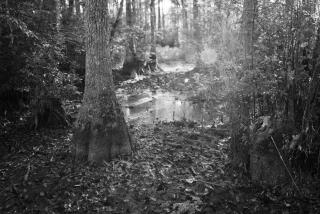History as a Lamp for Our Dark Ages
In an address to the American Historical Assn. in December, 1966, Barbara W. Tuchman, who died this week at the age of 77, described the opportunities she saw for historians in today’s world. Following are excerpts from that lecture. Given the current decline of the novel and the parallel decline of poetry and the drama, public interest has turned toward the literature of actuality. It may be that in a time of widening uncertainty and chronic stress the historian’s voice is the most needed, the more so as others seem inadequate, often absurd. While the reasons may be argued, the opportunity, I think, is plain for the historian to become the major interpreter in literary experience of man’s role in society. The task is his to provide both the matter to satisfy the public interest and those insights into the human condition without which any reading matter is vapid.
Historians have performed this role before. Although we have no figures on readership in classical Greece and Rome, it is evident from their continuers and imitators and from later references that Herodotus, Thucydides and Xenophon, Tacitus, Polybius, Josephus, Plutarch, Livy and the others were significant voices to their contemporaries.
Since the outbreak of World War II, the statistics of the book trade reflect the growing appetite of the public for biography, autobiography, science, sociology and history--especially contemporary history. . . .
People are turning to the books of reality for a truer image of man and society than is offered by contemporary novels. To look for the reason why fictional truth has gone askew is part of the historian’s task. The novelists’ failure is a consequence, I believe, of the historical experience of the 20th Century, which since the First World War has been one of man’s cumulative disillusionment in himself. The idea of progress was the greatest casualty of that war, and its aftermath was cynicism, confirmed by a second round of world conflict and by the implications of the Nazis’ gas chambers. Then the advent into man’s hands of unlimited lethal power has been topped by the frightening pressure of overpopulation, so that now we live under the weight of a weird paradox, which threatens us simultaneously with too many people in the world and too much power to destroy them. Finally, we are faced with mounting evidence--in pollution of air and water, in destruction of the balance of nature, in the coming ear-shattering boom of supersonic flight--that we cannot refrain from despoiling our environment. . . .
Man in the 20th Century is not a creature to be envied. Formerly he believed himself created by the divine spark. Now, bereft of that proud confidence, and contemplating his recent record and present problems, he can no longer, like the Psalmist, respect himself as “a little lower than the angels.” He cannot picture himself today, as Michelangelo did on the Sistine ceiling, in the calm and noble image of Adam receiving the spark from the finger of God. Overtaken by doubt of human purpose and divine purpose, he doubts his capacity to be good or even to survive. He has lost certainty, including moral and ethical certainty, and is left with a sense of foot-loose purposelessness and self-disgust which literature naturally reflects. . . .
Historians start with a great advantage over fiction in that our characters, being public, are invested with power to affect destiny. They are the captains and kings, saints and fanatics, traitors, rogues and villains, pathfinders and explorers, thinkers and creators, even, occasionally, heroes. They are significant--if not necessarily admirable. They may be evil or corrupt or mad or stupid or even stuffed shirts, but at least, by virtue of circumstance or chance or office or character, they matter. They are the actors, not the acted upon, and are consequently that much more interesting.
Readers want to see man shaping his destiny or, at least, struggling with it, and this is the stuff of history. They want to know how things happened, why they happened, and particularly what they themselves have lived through, just as after a record heat or heavy snow the first thing one turns to in the morning paper is the account of yesterday’s weather. And now more than ever, when man’s place in the world has never been so subject to question, when alienation is the prevailing word, the public also hopes to find some guidelines to destiny, some pattern or meaning to our presence on this whirling globe. Whether or not, as individuals, historians believe in one pattern or another, or some of us in none, the evidence we have to present provides reassurance in showing that man has gone through his dark ages before.
Reprinted with permission from “Practicing History” by Barbara W. Tuchman (Alfred A. Knopf, 1981).
More to Read
Sign up for our Book Club newsletter
Get the latest news, events and more from the Los Angeles Times Book Club, and help us get L.A. reading and talking.
You may occasionally receive promotional content from the Los Angeles Times.






